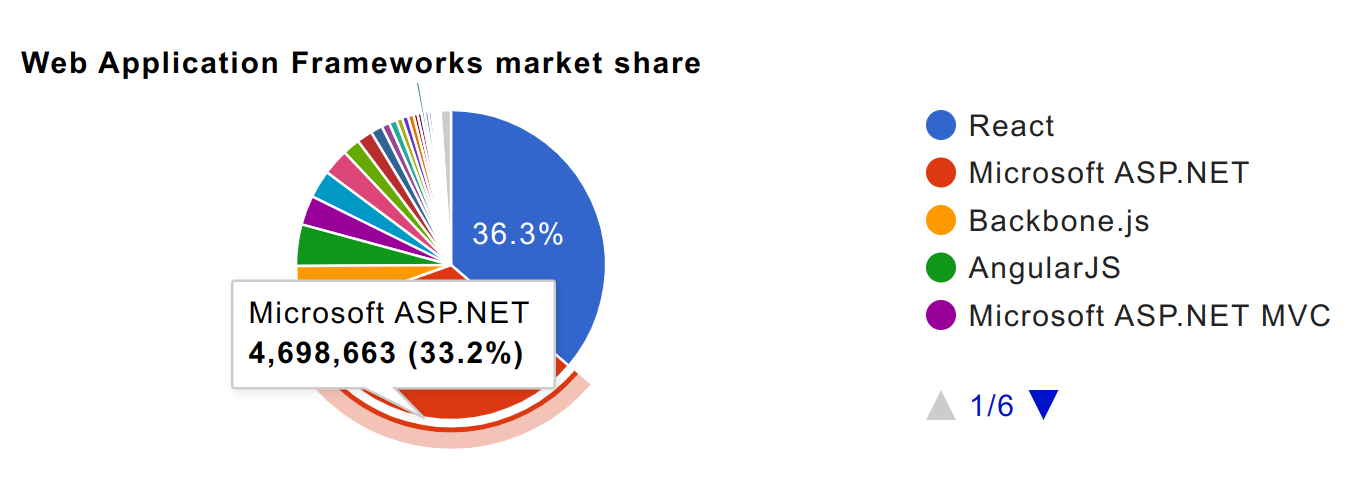Table of Contents
Is the platform dependency(i.e Windows) of the framework compelling you to make a technology switch from ASP.NET?
ASP.NET, with an enormous ecosystem of around 100K developers, 3,700+ companies outside Microsoft as well as a huge library with over 90K packages and 395,000+ stars on GitHub, has been one of the most preferred Application Development Frameworks. ASP.NET, a product of Microsoft, has a glorious history with innumerable achievements and developments, making it the choice of some incredible tech pioneers like Exxon Mobil, Intel, Dell, Asus, etc. An ASP.NET developer knows its worth, therefore switching to an entirely new technology merely due to a few features like platform-dependency, side-by-side versioning, etc. definitely seems a strenuous task to them.
Considering the impediments of ASP.NET as well as to address the evolving needs, Microsoft has come up with a new ASP.NET series ASP.NET Core, an open-source framework as well as the most thriving member of the humongous ASP.NET fraternity. With the release of ASP.NET Core, Microsoft has expanded the boundaries for developers, providing them the alternative of web application development on different platforms along with Windows.
ASP.NET Core is a simple yet effective technique that has gained prodigious popularity among developers since its release in 2016. ASP.NET Core is laid on a strong foundation, making it to be a promising and reliable Application Development Framework.
From platform dependency relaxation to the automatic compilation to cloud-based support, ASP.NET Core is bundled with numerous novel features along with some traditional ASP.NET functionalities.
Here is the list of following functionalities ASP.NET Core provides:
- An integrated for building web UI and APIs.
- Testability Architected.
- Razor Pages makes coding page-centric scenarios easier and more productive.
- Blazor lets you use C# in the browser with JavaScript. Share server-side and client-side app logic written with ASP.NET.
- Compatible to develop and run on Windows, macOS, and Linux.
- Provides an Open-source community.
- Integration of modern, client-side frameworks and development workflows.
- Supports hosting of RPC services using gRPC.
- A cloud-based & environment-based configuration system.
- A lightly, superfast, and modular HTTP request pipeline.
- Able to host on:
- Kestrel
- IIS
- HTTP.sys
- Nginx
- Apache
- Docker
- Provides tools to simplify modern web development.
However, before hopping on a decision, let’s check out how ASP.NET Core stands out and fits in some of the most crucial verticles of software development such as performance, cost, community support, speed, supported platform as well as architecture, etc.
1. Cross-Platform and Cross Architecture Framework
Consider you are building an application with a platform-restricted framework and you are bounded to use the same platform throughout the project. If you wish or need to switch to any other platform, so along with the change in the framework, you are compelled to start your project from scratch, requiring you to hire a new developer, invest more time and resources, etc, which is definitely not feasible for a business.
Being a Cross-Platform framework and having Cross Architectural Framework, ASP.NET Core liberates you from this restriction as well as the associated problems, empowering you to execute your project on platforms like Windows, Mac OS, and Linux, too on various architectures such as x86, x64 and ARM (Advanced RISC Machine). It not only relieves you from re-coding and re-testing the same application for different platforms but also eliminates the cost for the same.
2. Supports Side-by-Side Versioning
Unlike the previous versions of ASP.NET, the ASP.NET Core supports Side by Side Versioning, empowering to run multiple versions of the application on the same system. Side by Side versioning, with the help of the features like strong-named assemblies to bind type information and version-aware code storage, eliminates the DLL(Dynamic Link Libraries) conflicts, allowing different applications running on a machine to target a distinct ASP.NET Core version, accordingly.
3. Excellent Performance
One of the biggest advantages of using ASP.NET Core is the performance given by the framework. Here are some amazing features worth mentioning:
Hardware Intrinsics, providing access to hardware-related instructions like vector 2, vector 3, etc. which are not that easy to be exposed in a general-purpose mechanism, Span<T>, making it type-safe and memory safe, and Tiered Compilation, allowing the ASP.NET runtime to use the same method of an application with distinct assembly code implementations, ASP.NET Core gives an excellent performance. The characteristics like its versatility, easier maintenance, browser refresh as well as speed, contribute to its performance as well, making it the choice of many developers.
4. Open Source Framework
The best thing about an open-source framework is that it enables you to modify, review, or contribute the code as per your requirement and convenience, rather than forcing you to follow the master and work according to their working philosophies. ASP.NET Core is an open-source framework, that allows you to add new components and features to the code available on GitHub, as per the requirement of your software project.
Along with this flexibility, the user also gets the support of a humongous community who share their knowledge, ideas, and code, as well as guide the user by availing solutions to their problem. The active .NET Core Community, by providing quick response and on-time updates, saves a lot of time for the user, making the development process more agile.
5. Support for Cloud-Based Development
In this era of the internet, the companies are inclining more toward cloud-based services as well as applications, eliminating the dependency on physical devices and hence liberating the users from related issues like infrastructure cost and maintenance. ASP.NET core, along with the mobile backend, also supports cloud-based development, web application development, and IoT Development. ASP.NET Core provides amazing support for data storage and recovery, making it dependable for cloud-based applications.
Why Use ASP.NET Core?
A framework holds immense importance in the software development process, handling the security, scalability, server interaction, speed, and structure of the software. ASP.NET Core, a well-equipped and powerful framework, comes with so many amazing features, and with these notable simplifying features, ASP.NET Core brings significant advantages for the engineer, business, as well as the end-client.
ASP.NET Core is not restricted to any specific kind of enterprise or application, however, it proves to be the idle solution for all types of enterprises, big or small as well as any kind of application that is gaming, cloud-based, IoT applications, Desktop Application, etc.
If you are still on the fence regarding the technology to opt for your next project, or yet pondering about the efficacies of the technology, Get In Touch with us and make the process easier for you. However, if you have already made up your mind about ASP.NET Core, so without further ado, Hire an ASP.Net Core Developer and kick start the development.


























Leave A Comment